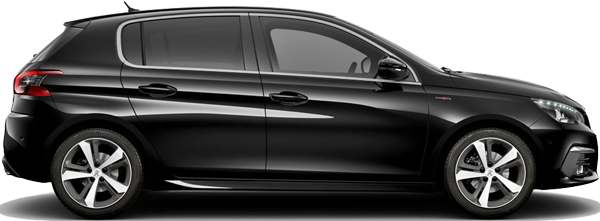The Comparative Analysis :
Peugeot 308 2.0 BlueHDi 150 EAT6 (17 - 18) vs. Hyundai i30 Fastback 1.0 T-GDI (17 - 18)
€ 29,400

€ 22,200

€ 29,400
Base Price ⓘBase price of a new vehicle with standard equipment in Germany at market launch.
€ 22,200
ⓘBase price of a new vehicle with standard equipment in Germany at market launch. Price Info
Vehicle Dimensions
The dimensions of these vehicles differ considerably. The Peugeot 308 2.0 BlueHDi 150 is 8 inches shorter, 0.4 inches wider and 1.3 inches taller than the Hyundai i30 Fastback 1.0 T-GDI.
Peugeot 308 2.0 BlueHDi 150
Hyundai i30 Fastback 1.0 T-GDI
57.4
71
80.4
56.1
70.7
80.7
71 in
Width
70.7 in
80.4 in
Width Incl. Mirrors
80.7 in
57.4 in
Height
56.1 in
103.1
167.4
104.3
175.4
167.4 in
Length
175.4 in
103.1 in
Wheelbase
104.3 in
Vehicle Weight
Peugeot 308 2.0 BlueHDi 150
Hyundai i30 Fastback 1.0 T-GDI
3053 lb
Curb Weight
2903 lb
4189 lb
Gross Vehicle
Weight
Weight
4012 lb

Weight Difference:
150 lb
4.91 %

General
Peugeot 308 2.0 BlueHDi 150
Hyundai i30 Fastback 1.0 T-GDI
L
Generation
PDE
Hatchback
Car Body Style
Hatchback
Diesel
Fuel Type
Mid-Grade Unleaded

Front-wheel drive
Drivetrain
Front-wheel drive

6-speed automatic transmission
Transmission
6-speed manual transmission
Engine
Peugeot 308 2.0 BlueHDi 150
Hyundai i30 Fastback 1.0 T-GDI
Straight-four diesel engine with turbocharger
Engine Type
Straight-three gasoline engine with turbocharger
4
Valves
4
4
Cylinders
3
2 L / 98 cu in
Displacement
1 L / 49 cu in
148 hp
at 4000 rpm
Power
118 hp
at 6000 rpm
Peugeot 308 2.0 BlueHDi 150
148 hp
118 hp
Hyundai i30 Fastback 1.0 T-GDI
273 lb‑ft
at 2000 rpm
Max. Torque
126 lb‑ft
at 1500 rpm
Peugeot 308 2.0 BlueHDi 150
273 lb‑ft
126 lb‑ft
Hyundai i30 Fastback 1.0 T-GDI
Performance
Peugeot 308 2.0 BlueHDi 150
Hyundai i30 Fastback 1.0 T-GDI
131 mph
Maximum Speed
117 mph
8.6 sec
Acceleration 0 to 62 mph
11.5 sec
62 mph
62
mph
mph
390 ft
0.000 sec

Peugeot 308 2.0 BlueHDi 150
62 mph
62
mph
mph
525 ft
0.000 sec

Hyundai i30 Fastback 1.0 T-GDI
▶ REPLAY
20.63 lb/hp
Weight-to-Power Ratio
24.6 lb/hp
Peugeot 308 2.0 BlueHDi 150
20.63 lb/hp
24.6 lb/hp
Hyundai i30 Fastback 1.0 T-GDI
Fuel Economy / Emissions
Peugeot 308 2.0 BlueHDi 150
Hyundai i30 Fastback 1.0 T-GDI
Fuel Economy
57 mpg
combined
45 mpg
Peugeot 308 2.0 BlueHDi 150
57 mpg
45 mpg
Hyundai i30 Fastback 1.0 T-GDI
49 mpg
city
39 mpg
64 mpg
highway
51 mpg
14 gal
Fuel Tank Capacity
13.2 gal
803 mi
Range
598 mi
Peugeot 308 2.0 BlueHDi 150
803 mi
598 mi
Hyundai i30 Fastback 1.0 T-GDI
Environmental Impact
84.3 kWh
Total Energy Consumption
per 100 miles ⓘThe total energy consumption per 100 miles is the amount of energy consumed by a vehicle when burning fuel or using electricity per 100 miles (final energy), and the energy required to produce the appropriate amount of fuel or electricity (primary energy).
per 100 miles ⓘThe total energy consumption per 100 miles is the amount of energy consumed by a vehicle when burning fuel or using electricity per 100 miles (final energy), and the energy required to produce the appropriate amount of fuel or electricity (primary energy).
98.5 kWh
Peugeot 308 2.0 BlueHDi 150
84.3 kWh
98.5 kWh
Hyundai i30 Fastback 1.0 T-GDI
Euro 6b (NEFZ)
Emission Standard
Euro 6b (NEFZ)
174 g/mi (NEFZ)
CO2 Emissions
193 g/mi (NEFZ)
Practical Convenience
Peugeot 308 2.0 BlueHDi 150
Hyundai i30 Fastback 1.0 T-GDI
5
Doors
5
5
No. of Seats
5
1135 lb
Maximum Payload
1109 lb
11.9 cu ft
Trunk Volume
12.7 cu ft








34.8 cu ft
Cargo Volume (Seats Down)
38.3 cu ft



















